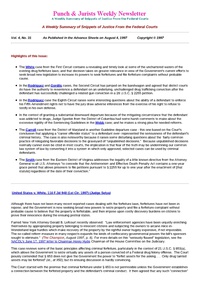The defendant in this case raised an interesting claim: he argued that he was entitled to a new trial because his Fifth Amendment rights had been violated when the jury, during its deliberations, had discussed his failure to testify in his own behalf. Citing Carter v. Kentucky, 450 U.S. …
The defendant in this case raised an interesting claim: he argued that he was entitled to a new trial because his Fifth Amendment rights had been violated when the jury, during its deliberations, had discussed his failure to testify in his own behalf. Citing Carter v. Kentucky, 450 U.S. …
Case affirmed the principle that a conspiracy conviction can be sustained even though all the evidence was circumstantial.
The defendant in this case was convicted of a conspiracy to distribute methamphetamine in violation of 21 U.S.C. § 841(a)(1); and he was sentenced to a term of 151 months …
Here Judge Sporkin granted a substantial downward departure on the grounds that he had become addicted to drugs in his youth and because of sentencing entrapment.
This decision contains another one of those frequent judicial bashings of the Guidelines that always seem to fall upon deaf ears. The …
In this case, the district court had allowed defense counsel to cross-examine a police officer about a hearsay declarant's drug use, drug dealing, and prior convictions, but had not allowed defense counsel to impeach the declarant's credibility by asking the officer whether the declarant had ever made false statements …
Case held that 1990 amendments to Victim and Witness Protection Act, which authorized restitution for conduct beyond the counts of conviction, were substantive changes to the law and could not be applied retroactively.
Case held that where the defendant was charged with "fixing" drunk driving convictions, the court held that the Government need only establish that the charged extortion had a minimal effect on interstate commerce, rather than any substantial effect.
Here the Court rejected the claim that the Government's forfeiture was invalid because it had failed to produce any evidence that the defendant personally used the property in question to further his illegal activities.
This decision reflects minor modifications to a decision first reported in our issue dated April 21, 1997 (Vol. 4, No. 16); and it stems from one of those massive (217 count) indictments against an ophthalmologist who was accused of Medicare fraud. In our original report on this case, we …
Among the many issues raised in this case, the court held that one defendant was unduly prejudiced by a joint trial with co-defendants who were the only witnesses who could verify his defense that he killed his victim in self-defense.
The issue in this case was whether the court could or should grant a downward departure pursuant to U.S.S.G. § 4A1.3 on the grounds that applying a "career offender status" to a defendant over-represented the seriousness of the defendant's criminal history. Here, the defendant had three qualifying prior felony …
Although many cases show that when the Government wants to have a previously imposed sentence increased the courts will jump through hoops to stretch the law, this case shows that when a defendant wants to have a sentence decreased, the courts rigidly follow the letter of the law and …
Although there have not been many recent reported cases dealing with the forfeiture laws, forfeitures have not been in repose; and the Government is now seeking broad new powers to seize property and file a forfeiture complaint without probable cause to believe that the property is forfeitable, and then …
Here the Court held that the district court lacked jurisdiction to modify the original sentence imposed, even though the district court granted the defendant's motion to stay entry of the judgment and a motion to reconsider original sentence.
Although many cases show that when the Government wants to …
Rodriquez v. United States, 116 F.3d 1002 (2nd Cir. 1997) (Judge Feinberg)
United States v. Gordils, 117 F.3d 99 (2nd Cir. 1997) (Judge Feinberg)
In last week's issue, we presented a detailed analysis of the issue raised in these two decisions - namely, whether a district court has the …
This decision contains another one of those frequent judicial bashings of the Guidelines that always seem to fall upon deaf ears. The defendant in this case was convicted of distribution of 50 grams or more of crack cocaine. His Guideline sentencing range was 70 to 87 months. Over the …
Here the Court adopted a rule that presumes that one a judge's actions create an impression of partianship, "curative instructions will generally not save the day" (Id., at 974).
Rodriguez v. United States, 116 F.3d 1002 (2nd Cir. 1997) (Judge Feinberg)
United States v. Gordils, 117 F.3d 99 (2nd Cir. 1997) (Judge Feinberg)
In last week's issue, we presented a detailed analysis of the issue raised in these two decisions - namely, whether a district court has the …
This is a revealing decision dealing with the new one year limitation on the filing of petitions under 18 U.S.C. § 2255, that became operative with the adoption of the Antiterrorism and Effective Death Penalty Act (AEDPA), which was signed into law on April 24, 1996. The petitioner in …
Here the Court vacated an arson conviction on the grounds that the Government had failed to prove its case.
In this case, the Tenth Circuit reversed an arson conviction on the grounds of insufficiency of the evidence. Essentially, it held that the Government had failed to prove its …
